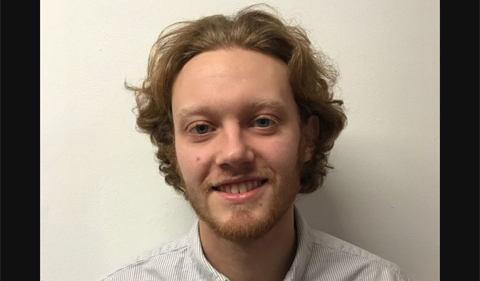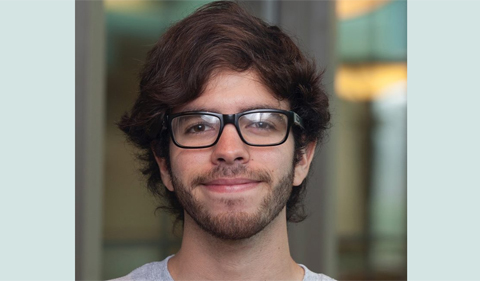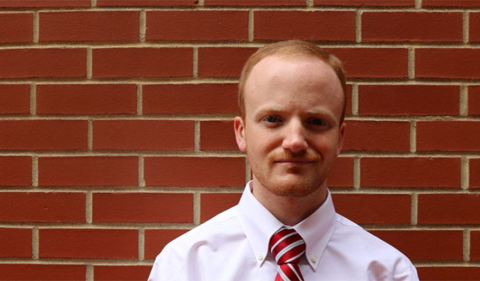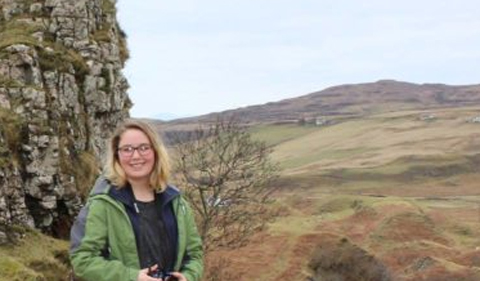The 2018 graduating class of Honors Tutorial College History majors includes four students who researched and wrote undergraduate theses.
Sam Benezra | On British Punk and Race Politics
“White Man (In Hammersmith Palais): Race, Punk, and Politics in 1970s England” by Sam Benezra explores the development of punk music in mid-1970s England in relation to the politics of race and immigration.
He analyzes how the Rock Against Racism campaign and other anti-racist activism competed with right-wing groups in a struggle to claim punk’s political identity. He researched and wrote his thesis under the direction of Dr. Kevin Mattson, Connor Study Professor of Contemporary History.
During his research, Benezra made extensive use of the Barry Miles Papers at the British Library and England’s Dreaming: The John Savage Archiveat Liverpool John Moores University Special Collections and Archives. He conducted this research during a January 2018 trip to London and Liverpool, funded by a grant from the Ohio University Provost’s Undergraduate Research Fund.
Benezra initially planned to study the development of the blues music genre in relation to the politics and culture of the U.S. South. However, “things changed after I decided to study abroad in London, and I became interested in British punk, and specifically its relationship to reggae and dub music.” The experience triggered Benezra to look into “how punk responded to the politics of race and immigration in England, and from there it slowly developed.”
“The biggest influence on me in terms of developing an interest in the subject was certainly studying abroad in London during my junior year. In terms of courses, Dr. Kevin Mattson’s HIST 1234 Pop and High Culture and Dr. Andre Gribou’s MUS 1240/2240 History of Rock Music helped me understand how to critically approach art and music through a historical lens,” said Benezra about how the History Department and OHIO helped him. “HIST 3111J (our major’s required junior composition course) also certainly helped me develop the research skills I needed to carry out this project.”
Benezra presented his thesis at the Ohio University Student Research and Creativity Expo this spring 2018. Reflecting on his experience presenting his research to the public, he noted that it was a new experience for him. One of his biggest challenges was “figuring out how to distill a research-based senior thesis into a short presentation.”
After graduation, Benezra is moving to New York City to begin an internship with the Museum of the Moving Image.
Francisco Cintron | On Law and Christianity in Muslim Spain
HTC student Francisco Cintron’s “‘Immersed in the Snares of Apostasy’: Martyrdom and Dissent in Early Al-Andalus” analyzes the role of the Islamic legal system in the voluntary martyrdoms of 52 Iberian Christians during the 850s.
He researched and wrote his thesis under the supervision of Dr. Kevin Uhalde, Associate Professor of History.
During summer 2017, Cintron conducted thesis research at various museums and historical sites in Madrid and Córdoba, Spain. Additionally, he enrolled in a competitive week-long course in Córdoba, organized by Casa Árabe, which brought in scholars from across the world to explore the early history of Islamic Iberia. Cintron’s research and course were made possible by funding the History Department’s Boston and Harvey Research Fellowships.
Citron was broadly interested in the history of the Iberian Peninsula since he first learned about the internal dynamics of Roman Hispania and the Visigothic takeover of the peninsula. After additional coursework in medieval European and Middle Eastern history, he wanted to study yet another period of significant religious transition and ethnic mingling. The first centuries of al-Andalus (Muslim Spain) suited his interests perfectly.
The majority of Cintron’s coursework at Ohio University has helped inform his thesis in one way or another.
“All of my History tutorials, with Dr. Kevin Uhalde, Dr. Mariana Dantas, Dr. Michele Clouse, and Dr. Ziad Abu-Rish have taught me to adequately do the historical research necessary,” he says. “Similarly, my Legal Anthropology tutorial with Dr. Haley Duschinski provided me with the socio-legal skills I needed to analyze modern and medieval legal systems and their social implications.
“In terms of specific courses, I would say Dr. Uhalde’s HIST 3520 Roman Law & Society, Dr. Clouse’s HIST 3715 Sex, Crime & Deviance in Medieval Europe, and Dr. Abu-Rish’s HIST 3320 Women, Gender & Sexuality in Middle East History all enabled me to more systematically think about social and legal dynamics in critical ways.”
Cintron presented a part of his thesis at the 12thAnnual Undergraduate History Conference this spring 2018. It was the second year he presented at the annual event.
This time in particular, Cintron feels “it was challenging to boil down a year’s worth of research into a 20-minute presentation, but it was nevertheless extremely rewarding to share my conclusions with the History Department faculty and students.”
After graduation, Cintron will be spending the 2018-19 academic year in Spain on a Fulbright research grant. He plans to apply to graduate school programs during that same year in hopes of further developing his research agenda.
Michael Gerber | On Masculinity, France, and Nazi Occupation
“Vichy’s New Man: National Regeneration and Historical Revisionism in French Education, 1940-1944” by Michael Gerber analyzes school textbooks published under France’s Vichy regime to show how national regeneration and historical revisionism in education worked hand in hand to realize its concept of a “New Man.”
Vichy, the collaborationist, right-wing regime that arose following France’s defeat by the Nazis, believed defeat had resulted from a decadent social and political culture. Its leaders rejected republicanism and pursued a utopian vision to fundamentally remake France, beginning with French men. Gerber researched and wrote his thesis under the directorship of Dr. Mirna Zakić, Assistant Professor of History.
During his research, Gerber made use of holdings at the Bibliothèque nationale de France (National Library of France) as well as the United States Library of Congress. Research travel to France was funded the History Department’s Fredrick H. Boston Fund and the Honors Tutorial College’s Dean’s Fund.
Gerber first became interested in his thesis topic during his study abroad in Grenoble, France. It was there that he had several conversations with his host grandfather about growing up under the Vichy regime.
Noting support from the History Department and OHIO, Gerber said, “I was fortunate enough to take two courses with Dr. Mirna Zakić, HIST 3682 Nazi Germany and HIST 3770 The Holocaust. Both these courses helped me contextualize Vichy within the broader narrative of World War II. I also gained critical insight into Vichy rule itself through an HTC tutorial with Dr. David Curp in which we examined the French experience of World War I.”
Gerber won the First Place Award for Outstanding Presentation at the spring 2018 Ohio University Student Research and Creative Activity Expo. Preparing for the expo was challenging yet intellectually stimulating, says Gerber. It “pushed me to summarize my entire senior thesis into a few concise paragraphs. It was a lot of work, but I found the experience rewarding and would do it again without hesitation.”
After graduation, Gerber will be enrolling at Case Western Reserve University School of Law.
Kristin Osborne | On Scottish Heritage and Contemporary Popular Culture
HTC student Kristin Osborne’s “‘This Noble Ruin’: Doune Castle’s Relationship to Popular Culture and Heritage” analyzes the relationship between popular culture and heritage at Doune Castle in Stirlingshire, Scotland.
Many major productions have used the site as a filming location for over the years—everything from Monty Python and the Holy Grail (1975) to Game of Thrones (2010-present). However, Doune Castle is also one of Scotland’s great castles with the likes of Mary of Guise, Robert, Duke of Albany, and John Home once calling it home. Osborne argues that the historical narrative of a site often comes as an afterthought to the media that made the site famous. She researched and wrote her thesis under the directorship of Dr. Jaclyn Maxwell, Associate Professor of History.
Osborne’s thesis research made extensive use of the National Records of Scotland, the National Library of Scotland, and the Historic Environment Scotland Archives and Collections. She conducted the bulk of her document collection in August 2017 while visiting the Scottish archives. Funding for this research trip was made provided by the History Department’s Harvey and Boston Research Fellowships and the Honors Tutorial College’s Dean’s Fund.
Osborne’s study abroad experience in Scotland during spring of 2016 sparked her interest in heritage sites as a whole. While there, she began to “notice that the sites we were visiting were often referred to by popular media that used them as filming locations.” Doune Castle was known as “the Monty Python and OutlanderCastle,” Glenfinnan Viaduct was “the Harry Potter railroad,” and Glencoe was “The Skyfall road.” Osborne became fascinated by how popular culture changes narratives and perceptions of historic spaces. As a historian, she “wanted to understand how history is shaped and molded by successive generations. Doune Castle offered an incredible case study of this question since it has been featured in so much popular media and historical fiction.”
Noting support from the History Department and OHIO, Osbourne said, “First was an HTC tutorial with the Geography Department’s Dr. Geoffrey Buckley on Scottish heritage tourism. Within the History Department, Dr. Mirna Zakić’s HIST 3770 The Holocaust introduced me to questions of collective memory, preservation, and the management of historical sites, through a specific case study of how a society deals with collectively memory and public spaces. It was in HIST 3111J that I developed a solid basis in planning and executing a major research project.”
Osborne presented her thesis at the Ohio University Student Research and Creativity Expo this spring. She says that it further excited her about the thesis research.
“The prospect of sharing my hard work with hundreds of people made me happy,” she said. “I wanted others to experience how amazing this topic is and why I fell in love with it in the first place. … It is one thing to know your own research, but another to effectively convey it to other people.”
After graduation, Osborne will be returning to Mackinac Island in Michigan to work as a tour guide and carriage driver. In fall 2018, she will begin at Miami University in Oxford, Ohio.
For more on the History Department, visit the department website. For information on the HTC History program, contact Dr. Miriam Shadis, Associate Professor of History and Director of Studies for HTC History.






















Comments